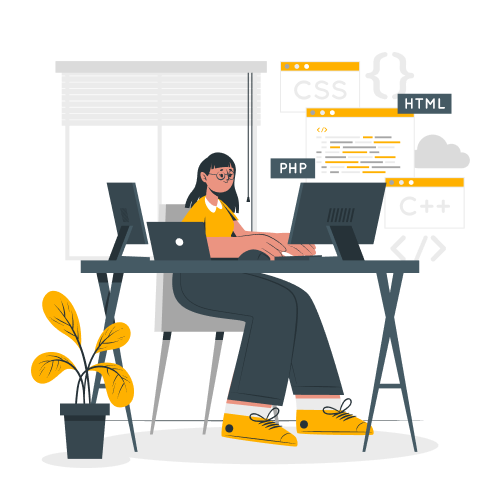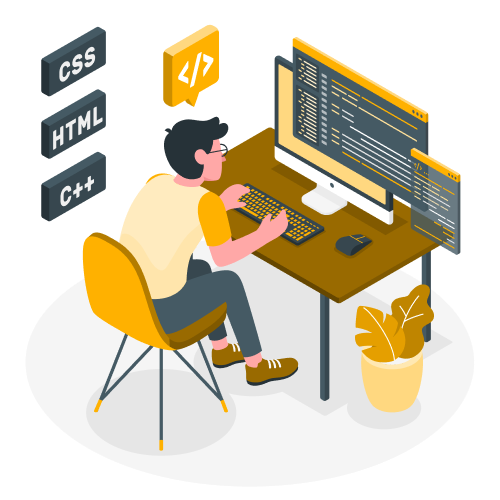The back-end or server-end is part of a website that isn't available for the clients to view or interact with. The major roles involved in back-end development include ensuring the website is working fine, executing a back-end logic, managing the servers and architecture and at last creating APIs.
What is PHP?
PHP, or Hypertext Preprocessor is a scripting language that was first released in 1995 for the purpose of web development. This language works on the server side and can be used along with HTML, as HTML codes can be present in a PHP file. In such scenarios, the HTML codes run on the browser, whereas PHP codes run on the server end.
PHP files unlike other programming languages are not restricted to a single format, as they can include text, CSS, HTML, JavaScript and PHP codes. Also, the PHP source code gets executed on the server, and its output returns in the browser as normal HTML. The extension used for PHP files is .php.
Why Learn PHP?
PHP is an immensely popular general-purpose scripting language driven to web development. Now let's take a look at some of the benefits offered by PHP.
Easily Learnable
Any beginner with no prior coding knowledge can easily learn PHP.
Flexible
As PHP has been typed dynamically, it isn't necessary to follow any sort of predefined rules while building features as per your needs.
Supports almost every database
This general-purpose language supports almost all generally used databases; for example, ODBC, MySQL and SQLite are all compatible with PHP.
Secure
PHP is bolstered with various security levels so as to offer a safe and reliable medium for web development.
Huge Support from the developer community
PHP, due to its vast benefits, is highly popular among developers working in the field of web development. Also, different people from the community often share their knowledge regarding PHP with other members.
Courses to become a web developer majorly include coding, computer programming, maths classes and graphic design. However, we have added a new training regime where learners will be able to work on live projects and will learn e-commerce website development as well.
Gaining in-depth command of all the concepts of the PHP course is one of the most significant steps to learn web development.
What Can PHP Do?
PHP, being a scripting language, can perform a myriad of functions, some of which have been mentioned underneath:
- It can create dynamic page content.
- It can assist in creating, opening, reading, writing, deleting and closing on the server side.
- It helps in collecting form data.
- It offers to send & receive cookies.
- It can also help in making changes in the database, such as modifying data.
- It assists in controlling user access.
- It promotes data encryption.
The best part about PHP is that it isn't limited to just HTML output, as we can fetch outputs in other formats as well, i.e. XML and XHTML.
OOP in Website Development Classes
Object-oriented programming, or OOP, is one of the best web development skills to learn, as the introduction of object-based programming in 1967 changed the software world forever. It is a programming paradigm that focuses on objects instead of actions and data instead of logic. This kind of programming is different from procedural programming as it creates objects that comprise both functions and data. It has various benefits, including:
- It is easy to perform and gets done way faster.
- It assists in providing a precise format for programs.
- It helps in keeping the PHP source code DRY, i.e. "Don't repeat yourself," and also promotes maintenance, modification and debugging.
- It also assists in creating fully reusable programs within less development time and source code.
There are two major elements of object-oriented programming, namely class and object. Object Oriented programming works majorly on 4 concepts that have been explained below.
Inheritance
Inheritance is an OOP concept where a class inherits all or some of the existing functions of another class. In such a scenario, the child class might inherit some or all variables of the parent class.
Polymorphism
In this OOP paradigm, a single function can be utilised for numerous objectives. This means the name of the function stays the same, however, the frequency of arguments and tasks can be different.
Data Abstraction
In this concept of OOP, all the unnecessary details that do not need to be shown to the end user get abstracted or hidden and only the data gets represented.
Encapsulation
Encapsulation is the process where the member functions and data are grouped together in an object.

